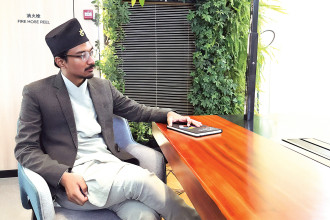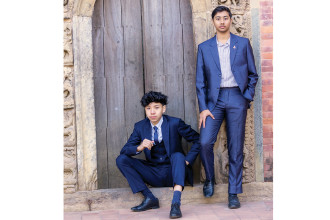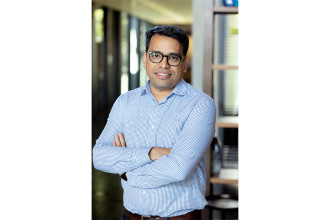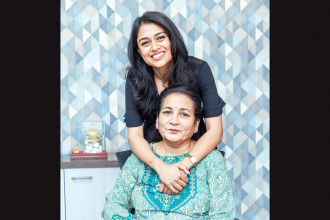-1747384393.jpg)
Vedika Murarka’s Educase was among the seven finalists from a pool of 150 applicants at the startup awards hosted by the Nepalese Young Entrepreneurs Forum in 2021. Murarka and team devised Educase’s product during the final year of her Master’s programme in Innovation and Entrepreneurship at the London School of Economics (LSE).
Educase is a backpack that folds into a desk to be used at home and school, a patent-pending portable work space. A desire to forge tangible impact in the lives of people is the guiding mantra behind Murarka’s social enterprise. “Educase is a backpack that easily folds into a desk to provide a personal study space for primary school children to use at school and at home. I genuinely believe education is the solution to all problems in the world,” says Murarka.
Murarka is adamant that her venture is neither an NGO nor a non-profit. Educase’s innovation is steeped in the product design behind their bags and its variants, and Murarka’s approach to getting these bags in children’s lives. Her’s is a social enterprise that is solving a social problem while making money but where the profits are reinvested into the business to stay sustainable.
The co-founders of Educase, Nepal’s Vedika Murarka and Pakistan’s Neha Ahmed were in the same group alongside students hailing from Cyprus, Nigeria and Singapore while in their final year at the LSE. Finding a common ground in the desire to create impact, the team zeroed into creating a product that would make a positive impact on the user. Through various variations on who their product would serve, the team discovered the Tutu desk – a printed plastic plank placed on student’s laps that the students were responsible for carrying to and from school. However, Murarka thought of all the young students back home who walk to and from school already burdened by books, stationery, and odds and ends.
Murarka and her team spent the weeks leading up to their presentation crafting a non-viable sample – a prototype of a desk that fits in a bag. Their final at LSE was a pitching competition that had Murarka and team compete against others who had devised their own business models and product. After a nerve-wracking day, she proudly reveals her team’s backpack won first place and the coveted cash prize that would become the seed capital for Educase.
“DIY is my forte,” shares Murarka. “I have the habit of tinkering. I am good with understanding how things are made.” Collaborating with a design student at London, an iteration of the Educase bag that we see today was drafted. Murarka returned to Nepal in 2017 with a Master’s degree and the determination to launch Educase in real.
On returning to Nepal, she secured a Public Policy Fellow position at Daayitwa in 2018. Educase was subsequently established the year after by Murarka and Ahmed. “In London, I was quoted £50 to create one prototype. In Nepal, it was Rs 1,500,” she reveals.
With 50 prototypes, Educase achieved liftoff with a pilot test in 2019 by distributing bags to students in Kathmandu and Kavre. However, the nation came to a halt soon after wiith schools shut down due to Covid 19.
The subsequent lockdown changed the course of their mission. The Educase bag for children in public schools striving with limited resources now went into their homes and created a workspace wherever they needed one. Murarka says, “We got the best feedback from teachers and kids alike”.
While the world grappled with isolation in 2020, Murarka was on the phone and on LinkedIn. She recalls, “We spoke to people from UNICEF America, UNICEF in Europe, we spoke to the biggest organisations in random parts of the world to see if we could collaborate with them.” Murarka connected with seven different people at different levels of UNICEF at the time. “When we just started, we were optimistic to an unrealistic extent,” says Murarka. “I thought the innovation of our design would have multiple organisations collaborating with us and we would be making thousands of bags.” But that was not the case, so she started to pitch Educase to local organisations where decision-making happened in fewer conversations.
The investment into the seven connections made previously with individuals at UNICEF matured eventually when Murarka found herself in a room with all seven of them. A few years later, another meeting followed that yielded no results. Finally, in December of 2023, she met the Head of Education at UNICEF who signed off on the distribution of 2000 Educase bags complete with the UNICEF logo to earthquake victims in Jajarkot. The bags were filled with essential supplies and aid.
-1747384887.jpg)
On this milestone, Murarka shares, “They placed an order for 2000 bags before which we had distributed 2000 bags overall. This one order matched our entire journey. We took two-and-a-half months to process the whole order. When I heard back from them, they gave me positive results. They have posted a few blogs about how their students are using these bags, there are videos of students using these bags, and blogs with their comments. That is the best feeling ever.”
Murarka envisions the evolution of Educase as a product without borders. “Educase is a Nepali brand through and through – the design, innovation and production are all Nepali. With more than 6,000 bags in children’s hands, I am not deviating from impact, rather, I will take it beyond Nepal. Educase can be manufactured or shipped to children in Pakistan, India or wherever they need it.”






